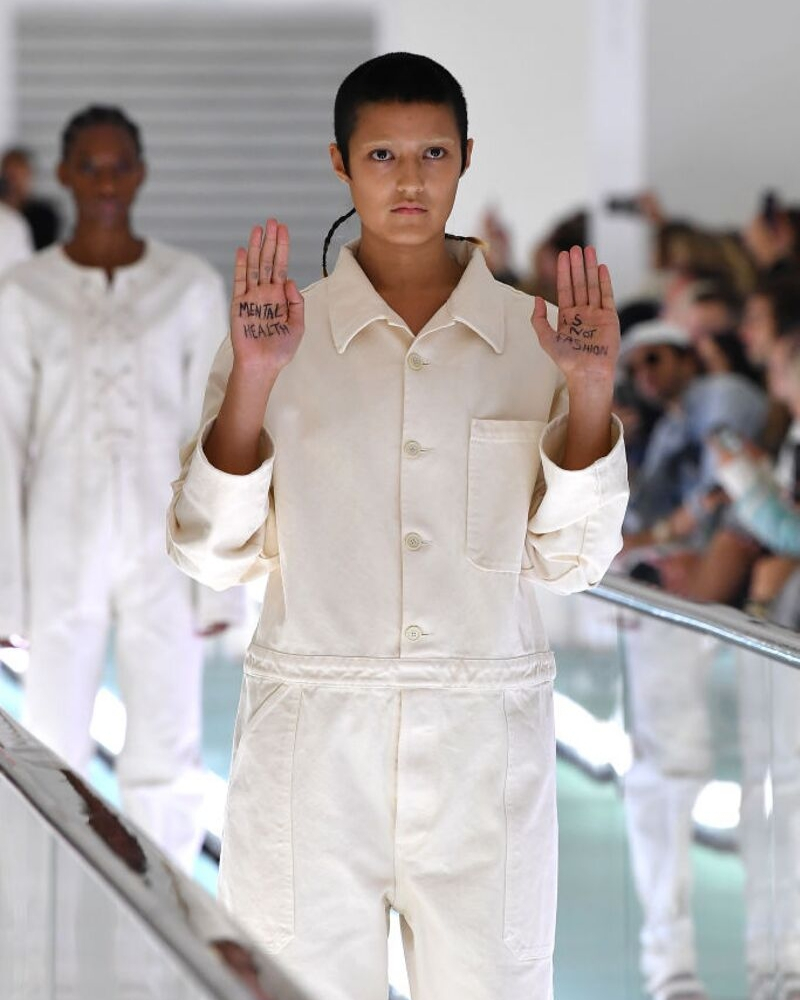
As the conversation about mental health becomes more mainstream, it seems like people everywhere are speaking out on the issue. It's an important development for a subject that was once seen as taboo. The latest person to enter the discussion is Ayesha Tan-Jones.
Ayesha is a nonbinary model, artist, and musician who uses the pronouns "they/them." When the 26-year-old saw that Gucci was using straitjackets in its Milan Fashion Week showcase of the spring/summer 2020 collection, Ayesha used the opportunity to take a stand against the practice.
Ayesha walked the runway in the show and decided to silently and respectfully make their feelings known on the issue. Ayesha held up their hands as they walked the runway, displaying the written message, "Mental health is not fashion." Ayesha addressed their decision to make a statement in an Instagram post on Sunday, explaining their own struggles with mental health.
When models for Gucci's spring/summer 2020 collection learned that the luxury brand would use straitjackets in its Milan Fashion Week runway show, they were greatly troubled by it. One model, Ayesha Tan-Jones, decided to protest the practice.
Ayesha is a model, musician, and artist. Ayesha identifies as nonbinary, using the pronouns "they/them." Ayesha explained that the decision to protest came at the last minute, telling BuzzFeed News that a fellow model "walked off the job" after seeing the straitjackets.
"For me, I chose to use the platform to highlight the issue," the 26-year-old London-based model explained. Ayesha discussed this decision in further detail in an Instagram post about the runway show's events.
Ayesha walked in the show, holding up their hands to reveal a message written on the palms. It read, "Mental health is not fashion," referring to the use of the straitjackets and how that could come across to those grappling with issues of mental health.

"I chose to protest the Gucci S/S 2020 runway show as I believe, as many of my fellow models do, that the stigma around mental health must end," Ayesha wrote in the note accompanying photos from the event.
"Worldwide, 1 in 4 people suffer from mental health issues, and LGBTQIA+ individuals are 3 times more likely to experience a mental health condition," Ayesha continued. "LGBTQIA+ youth are 4 times more likely to attempt suicide, experience suicidal thoughts, and engage in self-harm, as compared to youths that are straight."
"38-65% of transgender individuals experience suicidal thoughts," Ayesha noted. "And for black and brown communities, Indigenous communities, and Asian communities in the West, Mental health statistics are much higher compared to white adults."
"As an artist and model who has experienced my own struggles with mental health, as well as family members and loved ones who have been affected by depression, anxiety, bipolar and schizophrenia, it is hurtful and insensitive for a major fashion house such as Gucci to use this imagery as a concept for a fleeting fashion moment," Ayesha wrote.
Ayesha continued to discuss the stigma around mental health, noting, "Many people with Mental Health issues are still stigmatised in the workplace and in daily life, while many people do not consider mental health issues as 'real illnesses' as they may not be visible."

"[Straitjackets] are a symbol of a cruel time in medicine when mental illness was not understood, and people's rights and liberties were taken away from them, while they were abused and tortured in the institution," Ayesha explained.

"It is in bad taste for Gucci to use the imagery of [straitjackets] and outfits alluding to mental patients while being rolled out on a conveyor belt as if a piece of factory meat," Ayesha proclaimed.
"Presenting these struggles as props for selling clothes in today's capitalist climate is vulgar, unimaginative, and offensive to the millions of people around the world affected by these issues."
Gucci has responded in the wake of Ayesha's protest. "Uniforms, utilitarian clothes, normative dress, including straitjackets, were included in the #GucciSS20 fashion show as the most extreme version of a uniform dictated by society and those who control it. These clothes were a statement for the fashion show and will not be sold," Gucci captioned an Instagram post from the show.
"@alessandro_michele designed these blank-styled clothes to represent how through fashion, power is exercised over life, to eliminate self-expression. This power prescribes social norms, classifying and curbing identity," Gucci continued.
"The Creative Director’s antidote is seen in the Gucci Spring Summer 2020 lineup of 89 looks, he has designed a collection that conveys fashion as a way to allow people to walk through fields of possibilities, cultivate beauty, make diversity sacrosanct and celebrate the self in expression and identity. #AlessandroMichele."
Critics of the show offered mixed reviews, proving that the message the brand was trying to convey wasn't clearly interpreted by the audience. Gucci has committed itself to increasing diversity. Now it has to learn how to work to that end with its audience and consumers holding the brand accountable.




